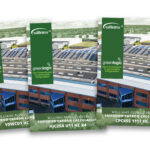Daniel Schwitzer, director of communications and sustainability at Amipak, wraps up the benefits of sustainable packaging
A number of challenges are facing today’s fish and chip shop. Having overcome the uncertainties brought about by Brexit and the pandemic, the industry is now confronted with increasing operational costs due to the Ukrainian crisis. Friers are facing disruptions in the supply of key ingredients, rising energy prices, and staff shortages.
These are complex and uncontrollable issues. Business owners must therefore seek innovative ways to increase and retain market share.
While the market is volatile, a number of other challenges have emerged that can be addressed and managed. Food-to-go outlets must comply with new food safety regulations while adapting to changing consumer behaviour. Post-pandemic consumers are understandably concerned about food safety and hygiene, but sustainability is also influencing purchasing decisions.
Single-use packaging waste has become a global problem, and although the issue was deprioritised during the pandemic, demand for sustainable alternatives has returned with vigour. However, consumers are unwilling to compromise on quality. They want more environmentally-friendly end-of-life options as well as high-performance packaging solutions. Addressing these concerns will go a long way toward boosting brand appeal.
Today, many fish and chip shops still serve food in expanded polystyrene (EPS) meal boxes designed with convenience in mind; they keep food warm during transit and allow consumers to eat on the go. They also enable friers to precisely monitor portion control, resulting in cost savings. However, despite having a relatively low carbon footprint during production — EPS uses less energy to manufacture than other materials — it is not routinely recycled. It therefore lacks the positive end-of-life options that consumers increasingly desire.
Paperboard
Food-grade paperboard carton boxes, trays and liners offer numerous advantages for fish and chip business owners. In the first instance, the material can be sourced from responsibly managed forests where trees are replanted much faster than they are consumed. These forests guarantee stringent environmental, social and economic standards.
Paper-based cartons also provide a host of benefits that enhance the user experience. The sustainable material not only withstands heat well, but it is also an excellent insulator. Food is kept warm and fresh. Maintaining the proper temperature of your food is important, but it must also maintain its quality. These high-performance packaging solutions are odourless and breathable; food does not escape or become soggy. The integrity of the food is protected as much as is practically required.
Unfortunately, recycled content made up of post-consumer and manufacturing waste cannot be used in food packaging. The product itself, however, can be widely recycled and formed into products. This is a highly attractive proposition to eco-conscious consumers.
Paper-based packaging is available in flat-packed, easy-to-assemble formats. This simple design optimises space during transit, lowering carbon emissions and improving delivery efficiency. It can also be quickly and conveniently accessed by servers or neatly stored away when not in use.
Greener measures are helping food-to-go enterprises gain market share. Improving your environmental credentials will undoubtedly strengthen your brand. Switching to highly functional and sustainable packaging will give fish friers a competitive advantage in 2022 and beyond.
Amipak 020 8451 5099 www.amipak.co.uk








